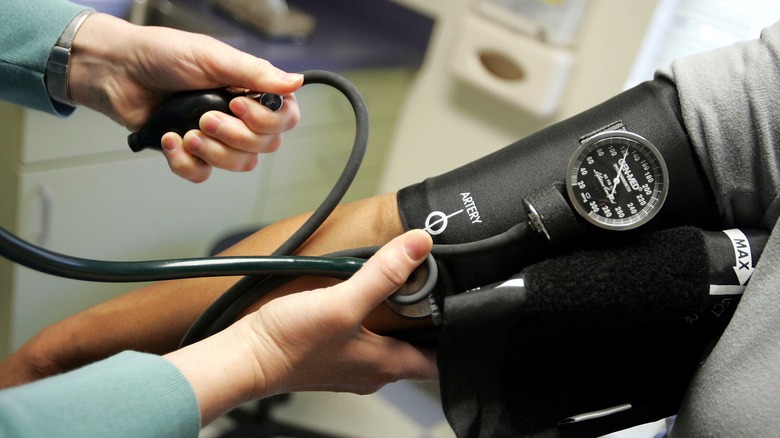Does High Blood Pressure Really Cause Headaches?
The World Health Organization has listed hypertension, or high blood pressure, as a serious condition and a major cause of premature death. They further note that as of 2015, 1.13 billion adults worldwide had hypertension, a condition that comes with various symptoms. Many people experience severe headaches, but are unsure if it's a symptom of high blood pressure. Before we discuss the relationship between headaches and hypertension, it's important to understand the definition and cause of high blood pressure.
Cleveland Clinic states that blood pressure refers to the pressure at which blood pushes against the walls of the blood vessels. The Centers for Disease Control and Prevention officially define high blood pressure as a condition where your blood pressure level is consistently more than 130 to 140 systolic and 80 to 90 diastolic. However, the causes for high blood pressure vary and it's normal for blood pressure to rise and fall throughout the day. For example, during a vigorous exercise session, blood pressure increases to push the flow of oxygen-rich blood through the body, keeping you energized (via Johns Hopkins Medicine). The problem arises when your blood pressure levels remain abnormally high.
Various factors can trigger high pressure levels. According to NHS, about 1 in 20 hypertension cases are caused by various underlying conditions or certain medications. The source also emphasizes that poor eating habits and negative lifestyle choices like excessive smoking can increase an individual's susceptibility to hypertension.
The connection between headaches and high blood pressure
According to a 2013 study published in the Iranian Journal of Neurology, although the topic remains controversial, there's little evidence that mild to moderate arterial hypertension or fluctuations in blood pressure are connected to headaches. The American Heart Association also reiterates this claim, asserting that headaches aren't linked to high blood pressure — except during a case of hypertensive crisis.
Mayo Clinic defines a hypertensive crisis as a sudden spike in a patient's blood pressure, often with a blood pressure reading beyond 180/120 millimeters of mercury (mm Hg) or higher. The source classifies hypertensive crisis as a medical emergency that can lead to strokes, heart attacks, or other life-threatening health problems. During such a crisis, the pressure in the skull increases, leading to a headache that feels unlike any kind of typical head pain (via Healthline). Unsurprisingly, headache treatments like aspirin will be ineffective in managing such a pain.
What other symptoms come with high blood pressure?
Over the years, hypertension has been tagged with the moniker "silent killer" (per the World Health Organization). This is mainly because symptoms are not always present in people who have it, and they are thus unaware of the damage it may be causing. According to the National Heart, Lung, and Blood Institute, about 1 in 3 American adults with hypertension are unaware that they have it, which means treatment is often delayed.
By the time symptoms show up in a person with hypertension, their case is usually severe, according to WebMD. Some common ones tend to show up if the blood pressure is too high, including chest pains, breathing difficulties, and confusion or fatigue. The American Heart Association also reveals that hypertension threatens the eye's anatomy and impairs the optic nerve, leading to vision loss. Some people often associate other symptoms like dizziness and sweating with high blood pressure, but WebMD says that's not always the case.
In regards to treatment, a mixture of lifestyle changes and medication might help, per Medical News Today. The source advises engaging in 150 minutes of moderate to intensive exercise each week. Other lifestyle changes include reducing salt intake, limiting alcohol consumption, and quitting smoking.



